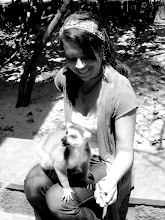I’m coming home in January! My time in Madagascar is so close to being
finished; I’m not sure if it hasn’t really hit me yet or if I’m just so excited
to move on with my life that I’m just going to skip the surreal
leaving-my-home-for-the-past-2-ish-years gloomy phase. I’ve been teaching my classes double time to
finish them by December. I’ve already
got most of my paperwork in order and have my stuff mentally arranged and
packed. The only major thing left to do
is realize my dream/#1 Peace Corps goal that I’ve had since August 2010: Build
an English center in Fort Dauphin. It’s
well on the way to becoming a reality – the major obstacle right now is money,
not to mention time. I originally promised
myself that I would never have to ask money from my family and friends for a
project, but I also never thought I’d be leaving so abruptly with my English
center so close to being completed. I’ve
posted tidbits here and there about my efforts to create the center throughout
the years, but here’s a more comprehensive description:
I have a dream that someday the people of Fort Dauphin
will have a place to gather to speak, listen, read, write, and learn in the
English language. Colonial ties to
France are slowly diminishing in Madagascar, and cultural and economic
influences from countries like South Africa, Britain, and especially the United
States are rising. Fort Dauphin is an
even more special case in that an unusually high proportion of people here can already
speak or have a real desire/need to learn English, largely due to the influence
from the Anglo-Australian mining company, former American Lutheran
missionaries, and international tourism.
Some days I literally cannot leave my house without some person,
business, or organization asking me to teach them English. I’ve often said that Peace Corps could put 10
education volunteers in this town and it still wouldn’t be enough to meet the
demand.
There used to be an American English center here, but it
failed largely because it depended too much on foreigners to teach and run
it. My goal is to create an English
center that is from the community and for the community. I want it to be run by local English teachers
and enthusiasts, not by Peace Corps volunteers or outside interests. It will be a place where students can read
books and literature, use interactive computer programs, hear and watch English
with AV equipment, and learn it together whether in classes or casual
interactions. I also want to stress that
this is NOT my idea. The community not
only inspired it, but asked for it directly.
I’m just helping the people in Fort Dauphin implement their own dream,
which is why I believe it will be both successful and sustainable. What I’ve obtained so far is a location donated
from the Regional government and a good start-up collection of books (mostly about
environmental issues and America) donated by the US Embassy in Antananarivo.
All that said, the project has start-up costs, but I have
less than 2 months to get it up-and-running.
I’ve been using a lot of my own money to cover minor expenses, but that’s
only going to get us so far. We will of
course be soliciting donations from local businesses, organizations, etc., but
that could take a while, especially since everything moves slower in
Madagascar. Some things we need to pay
for immediately: Repairs to the center location (think leaky roof, missing
windows, rusty locks…), paints and brushes to decorate the walls, furniture
(chairs, tables, bookshelves), a whiteboard and markers, general office
supplies, electricity, signs and advertisements, and an opening ceremony.
So please, if you have a few extra dollars (even just $5
will buy a can of paint) or a larger sum that you were considering donating to
a worthy cause, please consider donating it to my English center project so
that the people here in the south of Madagascar can learn English, advance
their careers or their studies, learn the value of community involvement and
volunteerism, and – most importantly – love America more than France! Kidding…
If you’re interested in donating, please contact me via
email or Facebook, or you can talk to my mom.
I can’t give you tax deductions, but I will paint your name or your
company’s name on the wall of the English center! I’ll also send you pictures and updates. Also, if anyone is interested in donating
books, equipment, or other materials, we’re definitely in need of a more
complete resource center. You’d have to
pay for shipping, but I think there might be discounts if you send library
materials.
